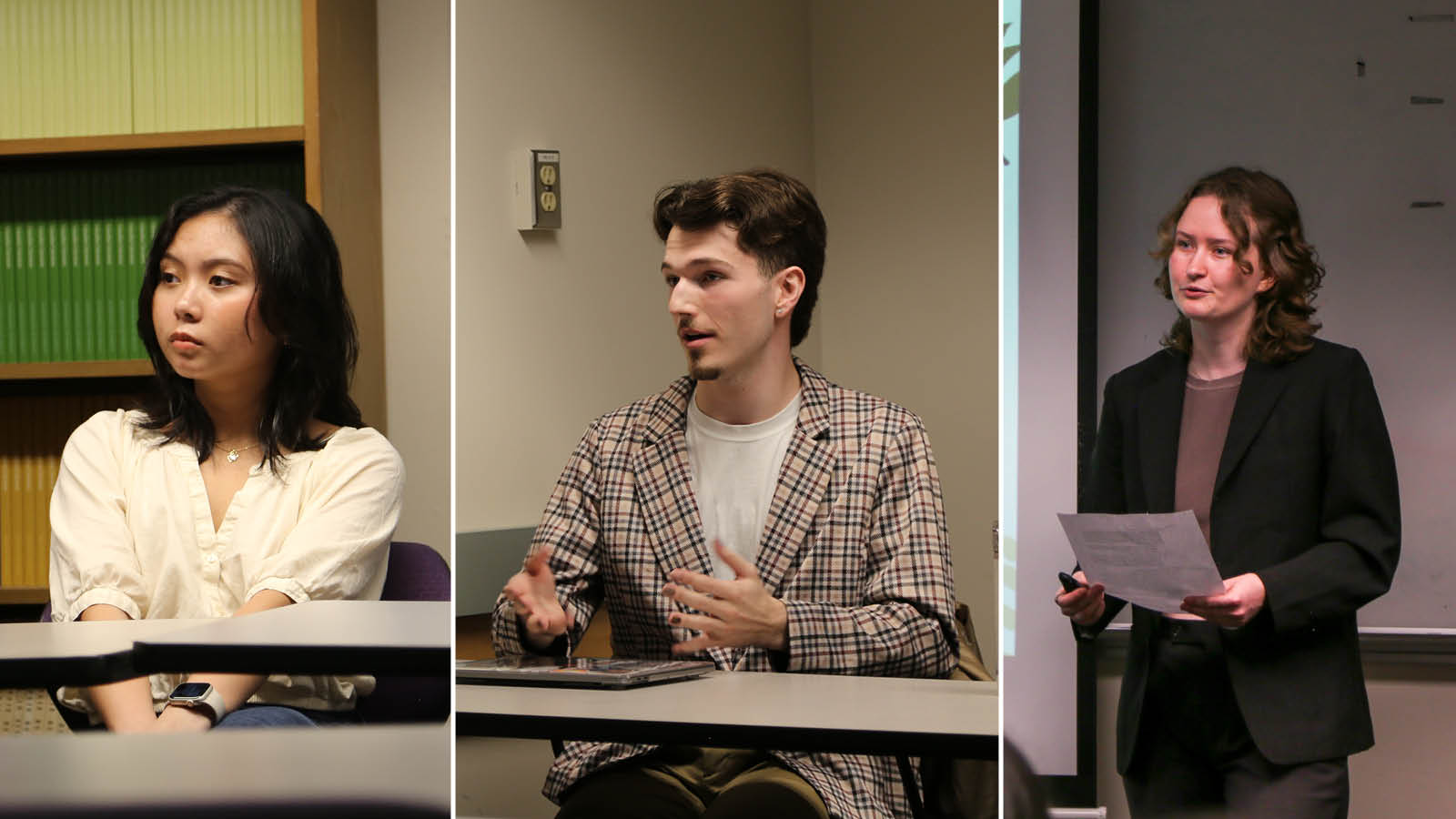Congratulations to the winners of this year’s Sociology Undergraduate Research Conference!


From left to right: Gabrielle Isabel Abando, Matthew Graham, and Lillie Goodson.
This year’s judging panel was comprised of past Honours students and members of the Sociology Students Association.
Presentations were judged on five criteria: effectiveness of arguments, audience engagement, organization and cohesiveness of presentation, visual support, and responses to Q&A.
Matthew Graham was the first place winner with his presentation on his honours thesis analysing news coverage on Canada’s policy shift to screening the sexual history of every potential blood donor.
The second place winner, Gabrielle Isabel Abando, presented on her honours thesis examining the everyday experiences of Filipino Canadians in local neighbourhoods and communities and exploring how specific spatial mechanisms make for a functional Filipino Canadian community.
Lillie Goodson rounded out the podium with her thesis exploring the ways that LGBTQ+ people negotiate their LGBTQ+ identities while participating in outdoor activities and outdoor communities.
You can read the winning abstracts below!
1st Place: Matthew Graham
Removing the gbMSM Demographic From Blood Donation Screening: Analysing News Coverage on Canada’s Shift to Individualised Sexual Behaviour Screening
In 2021, Canada amended its blood donation laws to screen every potential donor’s sexual history rather than screen only gay and bisexual men who have sex with men (gbMSM). While scholars and LGBTQ+ community members have called on the Canadian and international governments to adjust this blood law for years, a research gap persists regarding how the general Canadian public and media view this policy change. Thus, this paper determines how Canadian newspapers portray the policy change leading up to, as well as following, the amendment.
Additionally, this paper uses post-gay theory to investigate the level of gay-acceptance in Canadian society. The data is based on an analysis of Canadian newspapers (n=109) consisting of national, provincial, and local newspapers, and omitting non-Canadian reports on the matter. Canadian views on gbMSM have been increasingly positive overtime, and Canadian blood legislation has eased its deferral periods with little backlash in the past decade.
Combining these factors, this study expects to find that most newspaper articles will first validate the amendment by highlighting blood science approving the change, and subsequently highlight the positive effect the amendment will have on the overall Canadian blood supply. Thus, this research expects to find Canadian news sources positively reporting on the change.
This research will contribute to the growing literature on post-gay theory, but in a Canadian context. Furthermore, demonstrating the current level of acceptance regarding gbMSM in Canada.
2nd Place: Gabrielle Isabel Abando
‘Tao Po!’ An exploration of the role of Filipino Canadian neighbourhoods in anchoring and cultivating Filipino Canadian community
Filipinos comprise the fourth-largest visible minority group in Canada. With 95% of current Filipinos in Canada arriving after 1970, the Filipino Canadian community is standing at a crucial point demographically. The first generations have established their families, the second generation is coming of age and establishing their own new families, and a new generation of third-generation Filipino Canadians is being ushered in.
Current literature on Filipino Canadians focuses mostly on macro geopolitical relations that draw Filipinos out into Canada, but less research examines the everyday experiences of Filipino Canadians in local neighbourhoods and communities.
This paper addresses this gap by asking how specific spatial mechanisms make for a functional Filipino Canadian community. To address this question, I use a case study of the Joyce-Collingwood neighbourhood, locally known as ‘Filipinotown’, in the globalizing and diversifying city of Vancouver. This project uses a combination of ethnography and semi-structured interviews to better understand how the spatial composition of Joyce-Collingwood shapes the Filipino Canadian experience. I examine the unique attachments Filipino Canadians make to this space, and thus the vital role these neighbourhoods play in cultivating and maintaining community.
Findings include the creation and maintenance of hybrid Filipino and Canadian cultural identities, a sense of Canadian belonging enabled by access to Filipino cultural spaces and products in businesses, and evidence for the ‘spatial legacy’ for ethnic neighbourhoods across immigrant generations.
3rd Place: Lillie Goodson
“Out in the Outdoors”: The importance of LGBTQ+ inclusivity in the outdoors.
Inclusivity has been a hot topic in various outdoor communities over the past decade. Despite this, research and discussion about the experiences of LGBTQ+ people in the outdoors are lacking.
To fill this gap, this study uses qualitative research methods to explore the ways that LGBTQ+ people negotiate their LGBTQ+ identities while participating in outdoor activities and outdoor communities. Twenty-one LGBTQ+ people were interviewed about their experiences in these spaces. Initial thematic analyses indicate that LGBTQ+ people were less likely to disclose their sexuality or gender identity when they were participating in outdoor activities with people who do not identify as LGBTQ+. Some respondents shared that this was because they felt as though it would jeopardize the trust between them, and thus, compromise the safety of all involved parties.
Analyses also found that participants often used the word “indifferent” to describe the attitudes of cisgender heterosexual people in outdoors communities towards LGBTQ+ people. When asked to describe what they meant by this, some participants indicated that this indifference did not necessarily make these spaces feel inclusive and that, rather, “there's no neutral position to hold within [a structure with a history of exclusion]”. These are just a few of many themes in this study that point towards the urgent need to reconsider what it means for an outdoor space to be inclusive to LGBTQ+ people.
The goal of this analysis is to contribute to the conversation about how these attitudes influence when LGBTQ+ people feel safe and welcome in the outdoors and when they do not. The findings of this study could be used as a resource to inform outdoor groups and organizations of the experiences of LGBTQ+ people in the outdoors so that they can effectively implement programs, systems, and policies that contribute to the inclusion and support of LGBTQ+ people in these spaces.


